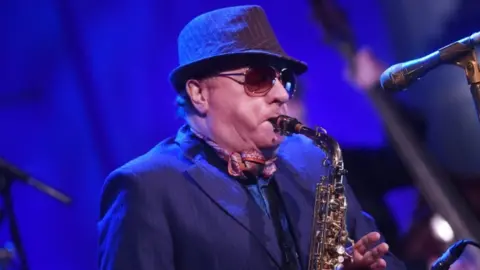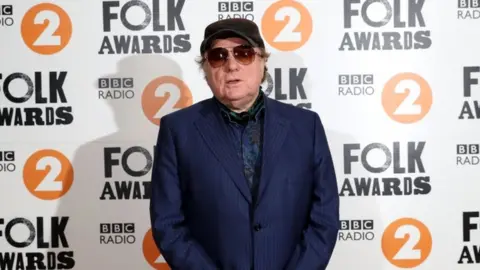Coronavirus: Sir Van Morrison to start start legal action over live music ban
 BBC
BBCSir Van Morrison is to legally challenge Stormont's "blanket ban" on live music in licensed venues because of coronavirus restrictions.
Hospitality and entertainment venues are closed as part of a six-week lockdown.
His lawyer Joe Rice told BBC News NI the ban had "financially and socially devastated" many people in NI.
A Department of Health spokesman confirmed that a letter has been received from Sir Van's legal team.
He said: "It is an accepted scientific fact that Covid-19 can spread when people are brought together in enclosed indoor locations.
"Stopping the spread of the virus is a priority for overnments across the world - to save lives and stop health services being overwhelmed."
Sir Van has been vocal in his criticism of Covid-19 restrictions and has written three lockdown protest songs.
At the time the Northern Ireland Health Minister Robin Swann wrote a scathing opinion piece for Rolling Stone magazine in response.
Mr Swann said the songs were "dangerous", challenging Sir Van to present his own scientific facts.
On Tuesday Mr Rice said a "pre-action protocol letter" has been sent on behalf of Sir Van to the NI Executive and Department of Health.
He said: "We have put the NI Executive and Department of Health on notice that we wish to challenge the blanket ban on live music in licensed premises in Northern Ireland by way of judicial review."
The letter calls on ministers to make public the medical and scientific basis for the regulation.
Mr Rice said the evidence behind the decision in Northern Ireland is "far from obvious".
Stormont regulation prohibit live music in indoor licensed venues in Northern Ireland.
If the ban is not lifted, the 75-year-old musician will seek leave from the High Court in Belfast to challenge the prohibition by way of judicial review.
Mr Rice said live music had not been defined in Northern Ireland's coronavirus regulations, with effectively a "blanket ban imposed on everything from a heavy metal band to a harp soloist."

He said that in England, before the most recent lockdown, live music had been permitted under the tiering system after risk assessments.
He said Sir Van had performed at the London Palladium last September.
He said the action was being taken behalf of the "thousands of musicians, artists, venues and those involved in the live music industry."
Mr Rice added: "He has been supporting many artists throughout this pandemic and is determined to ensure that, as we endeavour to emerge safely from this lockdown, artists and musicians will have a proper opportunity to play their part through live music to restore the cultural, social and economic wellbeing and success of our society."
The BBC has approached the NI Executive and Department of Health for a response.
The are a number of schemes that are available to support businesses and individuals since the start of the pandemic, including the Newly Self-Employed Support Scheme and the Culture, Languages, Arts and Heritage Programmes.

Van Morrison song alludes to debunked conspiracy theory
By Olga Robinson, BBC Monitoring disinformation team
Sir Van Morrison refers to a debunked Covid-19 conspiracy theory in one of his new anti-lockdown songs.
The track As I Walked Out includes the lyrics: "Well on the government website from the 21 March 2020 / It said COVID-19 was no longer high risk".
It's a reference to a UK government page that stated "Covid-19 is no longer considered to be a high consequence infectious disease (HCID) in the UK".
That much is true - but that doesn't mean that coronavirus is harmless.
The HCID designation is given for very fatal diseases: for example Ebola, which kills more than 50% of infected people.
Covid-19 was initially classified as HCID in January 2020 - when little was known about it.
By March, more information and testing prompted authorities to revise the classification.
It's now thought the Covid-19 fatality rate is closer to 1%.
The government message was widely shared on social media, largely by coronavirus denialists and opponents of restrictions, who have cited it as "evidence" that the lockdown was based on a "hoax".
